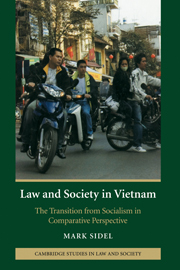Book contents
- Frontmatter
- Contents
- List of tables
- Acknowledgements
- Introduction
- Chapter 1 Constitutionalism and the emergence of constitutional dialogue in Vietnam
- Chapter 2 The emerging debate over constitutional review and enforcement in Vietnam
- Chapter 3 Motorbike constitutionalism: The emergence of constitutional claims in Vietnam
- Chapter 4 Economic law in the service of globalization: Labor law and labor export from Vietnam
- Chapter 5 Law, the press, and police murder: The trial of Lt. Nguyen Tung Duong
- Chapter 6 Law and the regulation of civil society: Nonprofit organizations, philanthropy, grassroots organizations, and the state
- Chapter 7 Testing the limits of advocacy: The emergence of public interest law in Vietnam
- Chapter 8 Donors, law and social justice in Vietnam: The uncertain promise
- Bibliography
- Index
Chapter 4 - Economic law in the service of globalization: Labor law and labor export from Vietnam
Published online by Cambridge University Press: 07 July 2009
- Frontmatter
- Contents
- List of tables
- Acknowledgements
- Introduction
- Chapter 1 Constitutionalism and the emergence of constitutional dialogue in Vietnam
- Chapter 2 The emerging debate over constitutional review and enforcement in Vietnam
- Chapter 3 Motorbike constitutionalism: The emergence of constitutional claims in Vietnam
- Chapter 4 Economic law in the service of globalization: Labor law and labor export from Vietnam
- Chapter 5 Law, the press, and police murder: The trial of Lt. Nguyen Tung Duong
- Chapter 6 Law and the regulation of civil society: Nonprofit organizations, philanthropy, grassroots organizations, and the state
- Chapter 7 Testing the limits of advocacy: The emergence of public interest law in Vietnam
- Chapter 8 Donors, law and social justice in Vietnam: The uncertain promise
- Bibliography
- Index
Summary
Economic law in Vietnam takes multiple forms, with multiple objectives. It can serve to strengthen Vietnam's integration into a global economy and to bring the benefits of that integration to Vietnam's citizens – either a narrow band, or a wide urban and rural community. The law governing the economy and various forms of commercial and business transactions can, however, also be used to restrict rights and opportunities in a rapidly marketizing economy, particularly rights and opportunities for the poorer and weaker in Vietnamese society, as it frees the creative forces of entrepreneurs and provides flexibility for the domestic business sector (Greenfield 1994).
Most recent academic work on Vietnamese economic law analyzes the role of law in corporate, commercial, contracting, foreign investment and related contexts. Here we look at an another important and recent example of Vietnamese economic law at work – the role of law in facilitating opportunities for Vietnamese workers in the globalizing economy, and in controlling and restricting workers' rights as well. The protection of export laborers under Vietnamese law and the cases that have arisen in this arena illuminate a key problem in Vietnamese legal reform: what and who does the law effectively protect? Is law intended to defend the rights of those with fewer protections in society, does it primarily serve as a tool for the extraction of economic profit by government and private interests from workers and other less powerful groups, or is it intended to balance these interests? And what are its actual effects?
- Type
- Chapter
- Information
- Law and Society in VietnamThe Transition from Socialism in Comparative Perspective, pp. 92 - 118Publisher: Cambridge University PressPrint publication year: 2008

